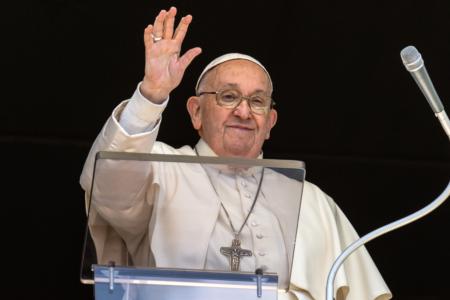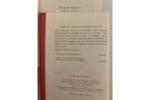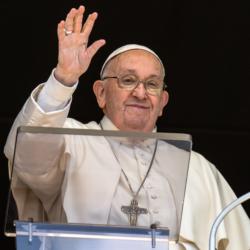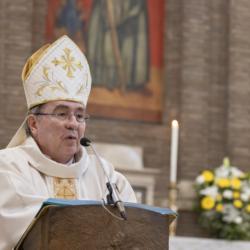Nuncio: World leaders must recognize human dignity begins at conception
UNITED NATIONS (CNS) -- Archbishop Bernardito Auza, the Vatican's U.N. nuncio, said he was glad world leaders talk about human dignity in dialogues today about human rights, but he said they must recognize that such dignity begins at conception.
In a March 19 presentation at the United Nations, he said humans cannot be reduced to "the sum of their body parts, vital signs, or physical or intellectual attributes" and that human dignity is "not a scientific category but an ethical one."
"Every person has this dignity by the very fact of being human. We bear that dignity at conception," he said, adding that Christians believe human dignity "flows from our relationship with God."
The archbishop particularly stressed that an understanding of human dignity is central to human reproduction -- an understanding of the dignity of the woman involved, as well as the man involved "and the child parents hope to conceive," but this is not always the case.
"Various modern techniques of human reproduction do not respect this full dignity of the woman. They regard fertility and pregnancy as diseases rather than normal states of a woman. They reduce or reject, rather than reverence, the motherly aspects of a woman's body and personality," he said.
Archbishop Auza made the comments at a conference on "Defending Human Dignity in Reproductive Health: Exposing the Dangers of Assisted Reproductive Technologies and Highlighting Successful Infertility Treatment Using the Billings Ovulation Method."
Modern techniques of in vitro fertilization are "not worthy of a woman's dignity. A woman is not a biological specimen, but a person, and any interventions on her body and personality must be more than technologically effective, but respect her nature as a person and the dignity and love to which as a person she's owed."
He also noted that men have an "intrinsic dignity that must always be respected in attempts to help parents conceive. We must care for men enough to speak frankly: In many of the new techniques of assisted reproduction, men are reduced basically to serving as sperm donors, something demeaning of their personal dignity. Men are human beings, not horses, and any attempt to diminish men basically to purveyors of biological material is unworthy of their dignity."
Archbishop Auza said the "fatherly nature of a man goes far beyond his providing 23 chromosomes to a future child" and involves "a union of love with the child's mother" and a commitment to raising the child with the mother.
He also urged children's dignity to be respected in the way they are brought into the world and treated once their life begins.
"Every child deserves to be conceived in an act of love between two parents who are totally committed to each other for the long term and to raising together those children arising from their interpersonal bond," he said.
He also stressed that "children must be begotten in love, not manufactured in labs. Children are persons, not products."
The archbishop spoke of the "terrible offenses against human dignity that occur" when human embryos created at fertility clinics are thrown away, frozen or manipulated for genetic testing.
"Human beings must not be treated simply as masses of cells to be chosen or rejected, used or discarded. Once we refuse to respect human dignity at one stage of life, then there is no firm foundation to respect human dignity at any stage of life. Human dignity becomes arbitrary, something that some human beings have and others don't," he added.
The archbishop said it is appropriate for science to assist a couple to conceive in ways that do not violate Catholic teaching, such as hormonal treatments and the unblocking of fallopian tubes.
One way to help couples who are struggling to conceive children is the Billings ovulation method, a form of natural family planning, which he said the Catholic Church approves because it "fully respects the dignity of the woman, the man and the child."


















